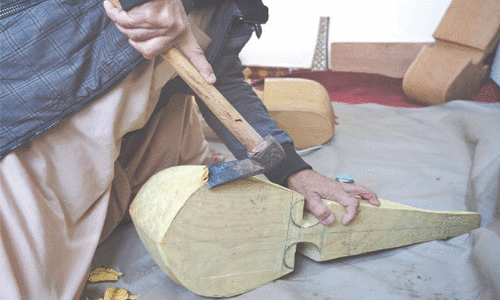KATHMANDU: Nepal’s Maoists were pushing on Wednesday to build a coalition government with rivals following the upset victory by the former rebels in landmark elections, with vote counting nearing completion.
“We will lead the government, there is not doubt about that, but we want other parties to join us in the government,” senior Maoist leader Dinanath Sharma told AFP.
The Maoists are comfortably ahead in the vote for a 601-member constituent assembly, whose first job will be to abolish the 240-year-old monarchy.
Vote counting is expected to finish late Wednesday and the Maoists have already won 120 seats of 240 available in the first-past-the-post part of the election.
Another 335 seats will be chosen by proportional representation, under which the Maoists have garnered around 30 per cent of the vote -- or another 100 plus seats, according to poll officials.
The remaining 26 seats will be allocated by the new government.
The traditionally strong Nepali Congress (NC) has won just 37 seats in the first-past-the-post system, and looks set to gain around 74 more from proportional representation.
“By Wednesday evening, we will get the results of all the votes in proportional representation but we might declare the final numbers on Thursday,” election commission spokesman Laxman Bhattarai told AFP.
The Congress and the Communist Party of Nepal (Unified Marxist-Leninist, or CPN UML) have unexpectedly lost their domination of Nepal’s politics. Both are now weighing whether to join the new coalition government.
“We have asked them to join us, but there are factions within both the NC and UML who are against it,” said senior Maoist Sharma.
A senior newspaper editor said on Wednesday it was in the best interests of the Maoists to form a coalition.
“Maoists want the NC and UML in the government to give it international legitimacy and to ensure that the constitution-drafting body can function smoothly,” Ameet Dhakal of the Kathmandu Post told AFP.
But the mainstream parties, who had expected to take the lion’s share of seats, are wary the Maoists will marginalise them.
“The parties are reluctant to join the government because they fear that the Maoists will take all the credit for positive achievements, and blame them for any failures,” Dhakal said.
The polls were a central strand of the 2006 peace deal reached between the former insurgents and mainstream parties after 10 years of civil war that left at least 13,000 people dead.
The fate of King Gyanendra looks sealed following the victory of the ultra-republican Maoists, who launched a “people’s war” aimed at toppling the monarchy in 1996.
Gyanendra came to the throne in 2001 after a crown prince shot the more popular King Birendra and eight other member of the royal family and then turned the gun on himself.
In 2005, Gyanendra sacked the government and assumed direct control, saying the move was needed as politicians had failed to tackle the bloody insurgency.
The mainstream parties made an alliance with the Maoists in late 2005, and in 2006 orchestrated massive protests that forced the king to end direct rule.
Wednesday was “Democracy Day” in Nepal, a national holiday marking Gyanendra’s climbdown on April 23, two years ago.
The speaker of the current parliament said that it was essential for the alliance between the Maoists and mainstream parties to continue.
“The unity of the seven parties is very crucial in giving this peace process a safe landing,” house speaker Subash Nemwang told reporters.
The Maoists urged the king this week to step down ‘gracefully.’ Otherwise he faces being forced out when the constituent assembly sits in the coming weeks to formally abolish his dynasty, declare the country a republic and rewrite the constitution.—AFP















































Dear visitor, the comments section is undergoing an overhaul and will return soon.